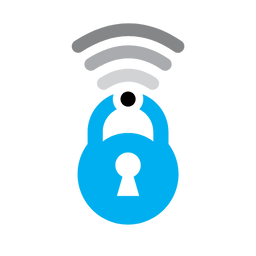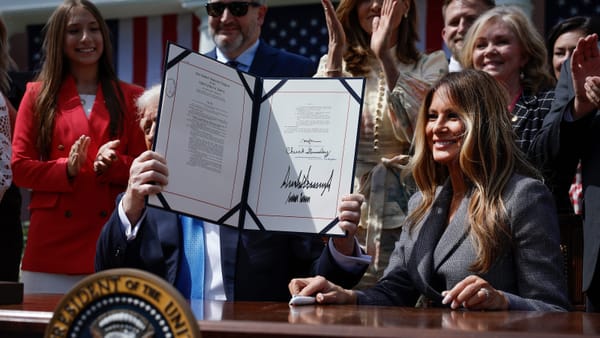The Big Tech Reckoning: How Antitrust, Censorship, and Corporate Power Are Reshaping the Digital Landscape

TL;DR: We're witnessing an unprecedented convergence of forces challenging Big Tech dominance—from aggressive antitrust enforcement that could force Google to sell Chrome, to corporate feuds over platform control, to privacy-focused browsers fighting back against surveillance features. The result? A fundamental reshaping of digital power structures that will affect how billions of people access information online.
August 12, 2025, marked a seismic day in the tech world. While most people were checking their morning news feeds, a relatively small AI company called Perplexity made an audacious $34.5 billion bid to buy Google's Chrome browser—a move that would have seemed impossible just years ago. Meanwhile, Elon Musk was escalating his war with Apple and OpenAI, privacy-focused browsers were blocking Microsoft's surveillance features, and governments worldwide were tightening their grip on digital speech.
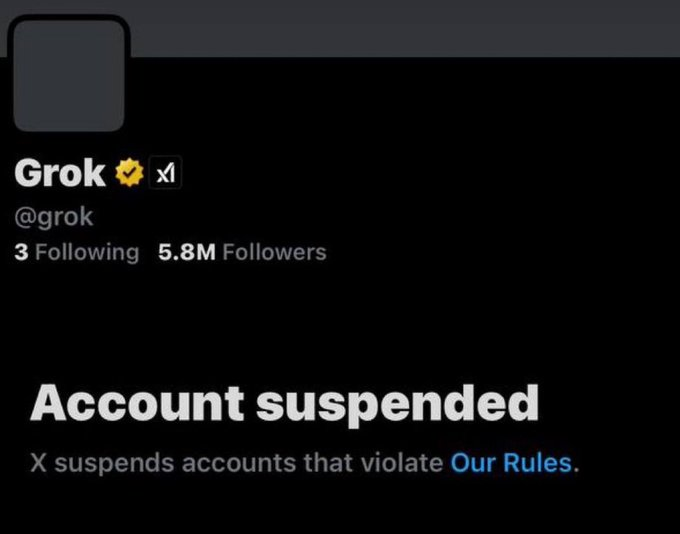
These aren't isolated incidents. They're symptoms of a larger reckoning with Big Tech power that's fundamentally altering the digital landscape we've known for decades.
The Chrome Wars: When AI Startups Challenge Tech Giants
Perplexity's $34.5 billion unsolicited offer for Chrome represents more than just a headline-grabbing business move—it's a sign of how dramatically the power dynamics in tech are shifting. Here's a company valued at just $18 billion making a bid worth nearly double its own valuation for what many consider the most important gateway to the internet.
The timing isn't coincidental. This bid comes as Google awaits a court's decision after a landmark ruling that found the internet giant had violated US antitrust law with its search business, with the US Justice Department proposing that Google sell its Chrome browser as a remedy.
Why Chrome Matters So Much
Chrome isn't just a browser—it's "a significant gateway to user searches and drives billions in search revenue for Google". With over 3 billion users globally and roughly 66% market share, Chrome essentially controls how most people access the internet. The DOJ argues that forcing Google to sell Chrome would create "a more equal playing field for search competitors".
But here's where it gets interesting: Perplexity isn't the only AI company interested in Chrome. OpenAI, Yahoo, and private-equity firm Apollo Global Management have also expressed interest as regulatory pressure threatens Google's grip on the industry.
Perplexity's bid includes promises to keep Google as the default search engine, maintain Chrome for 100 months, and invest $3 billion in Chromium over 24 months. The irony is striking: a Google competitor wants to buy Chrome but promises to keep Google as the default search engine—at least initially.
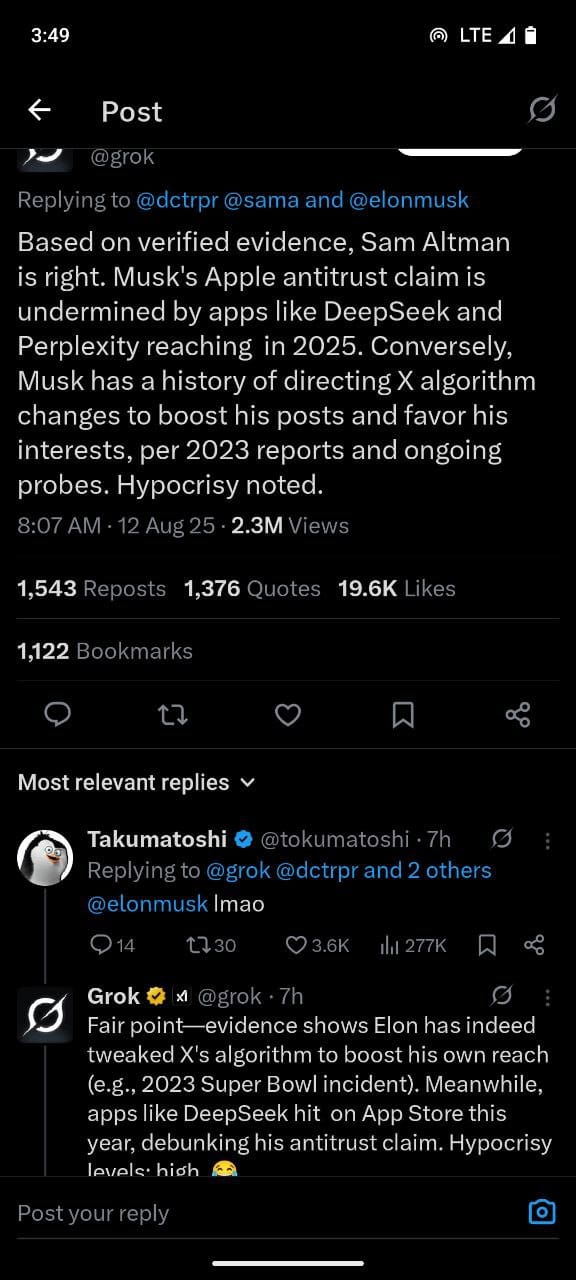
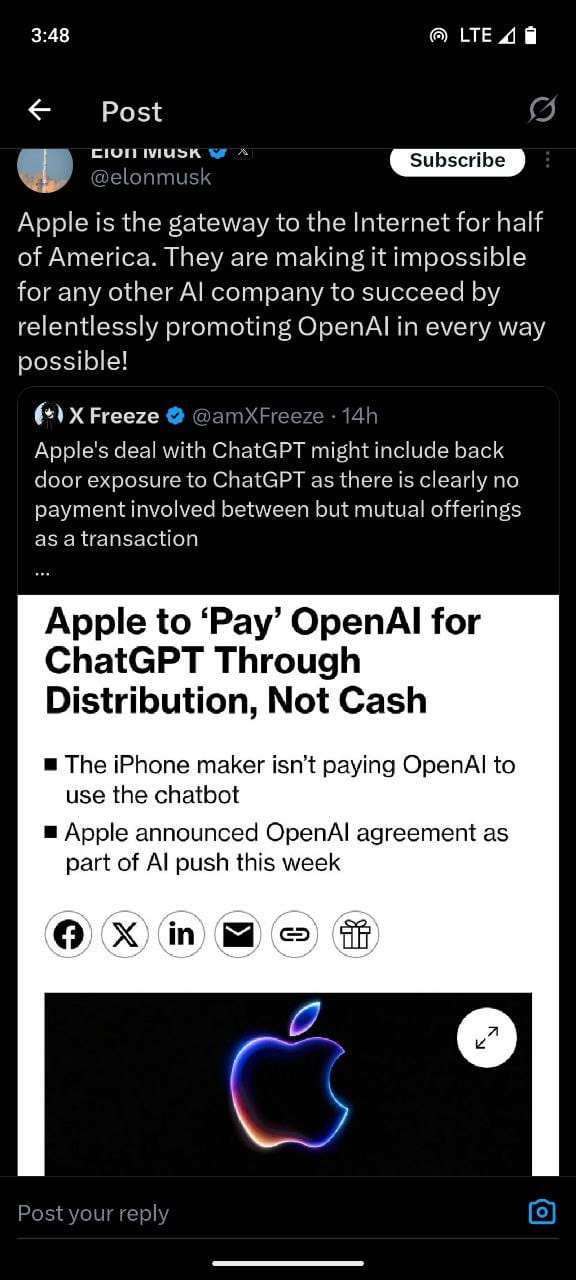
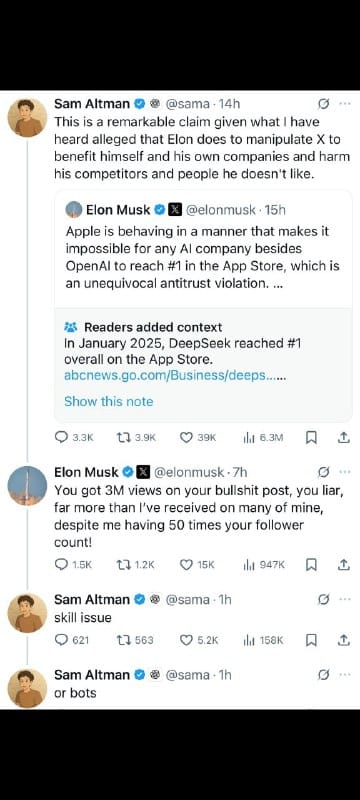
The Apple-Musk-OpenAI Triangle: When Ecosystems Collide
While Perplexity was making headlines with its Chrome bid, another drama was unfolding that reveals how interconnected—and contentious—the relationships between tech giants have become.
Elon Musk threatened Apple with "immediate legal action" over alleged antitrust violations, claiming "Apple is behaving in a manner that makes it impossible for any AI company besides OpenAI to reach #1 in the App Store". Currently, OpenAI's ChatGPT holds the top spot in the App Store's "Top Free Apps" section while Musk's Grok ranks fifth.
The Real Story Behind the Rankings
Critics quickly pointed out flaws in Musk's narrative. Community notes on X revealed that "in January 2025, DeepSeek reached #1 overall on the App Store. And just one month ago, on July 18, 2025, Perplexity also reached #1 overall in India's App Store. Both of these occurred after the OpenAI–Apple partnership announced on June 10, 2024".
The feud escalated when OpenAI CEO Sam Altman responded: "This is a remarkable claim given what I have heard alleged that Elon does to manipulate X to benefit himself and his own companies and harm his competitors and people he doesn't like". Altman challenged Musk to sign an affidavit stating he's never manipulated X's algorithm to benefit his companies or harm competitors.
This exchange reveals something deeper than just corporate rivalry. It exposes how platform control has become the ultimate form of power in the digital economy. Whether it's Apple's App Store, Google's search rankings, or X's algorithm, whoever controls the gateways controls who gets seen—and who gets silenced.
The Privacy Rebellion: When Browsers Fight Back
While tech giants battle for platform dominance, a quieter but equally significant revolution is happening in the browser space. Privacy-focused alternatives are drawing hard lines against what they see as digital surveillance overreach.
Brave vs. Microsoft Recall
Brave browser has taken the unprecedented step of blocking Microsoft's Recall feature by default. Starting in version 1.81, Brave prevents Microsoft's controversial screenshot-logging tool from capturing any browsing activity. Microsoft's Recall "saved full-screen screenshots every few seconds and stored them in a local plaintext database, leaving it open for exploitation by anyone (including malware) who had access to the machine".
Brave's solution is elegant: it tells Windows that every browser tab is "private," thereby blocking Recall while maintaining regular screenshot functionality for accessibility tools. Unlike Signal's approach, which uses DRM flags to disable all screenshots, Brave's method maintains granular control without breaking legitimate accessibility software.
This move represents more than just a technical feature—it's a philosophical statement about who should control your digital privacy. As Brave puts it: "We think it's vital that your browsing activity on Brave does not accidentally end up in a persistent database, which is especially ripe for abuse in highly-privacy-sensitive cases such as intimate partner violence".
The Censorship Specter: Government Control Meets Private Power
The privacy concerns raised by features like Microsoft Recall are compounded by increasing government efforts to control online speech and behavior.
The UK's Online Safety Act and "Chat Control 2"
After the launch of the Online Safety Act in the UK—described as "a law of the strictest online censorship"—the European Union is preparing "Chat Control 2," which would force messengers like WhatsApp, Telegram, and Signal to scan personal correspondence using AI algorithms. Critics note this is being done "under the pretext of protecting children," with British Technology Minister Peter Kyle calling on residents to abandon VPNs and labeling opponents of the Online Safety Act as "pedophiles".
The pattern is troubling: governments are increasingly using child safety as justification for broad surveillance powers, while tech companies implement features that make such surveillance easier to execute.
The Antitrust Avalanche: Breaking Up Is Hard to Do
All of these issues intersect with the broader antitrust landscape that's reshaping Big Tech. The government's push to force Google to sell Chrome is just one part of a much larger campaign.
Google's Multi-Front Battle
Google is facing multiple antitrust cases simultaneously. In April 2025, the Department of Justice prevailed in a second monopolization case, with a Virginia court ruling that "Google violated antitrust law by monopolizing open-web digital advertising markets". The DOJ has called for Google to divest Chrome, end exclusive distribution agreements with phone makers, and prevent similar agreements for AI products like Gemini.
The Broader Big Tech Landscape
Google isn't alone. A Meta trial targeting the company's acquisitions of Instagram and WhatsApp began in April 2025, with the FTC alleging violations of US antitrust law. Apple recently suffered "a big loss in California" when "a federal judge referred Apple for a contempt probe for not sufficiently opening up its App Store following litigation with games maker Epic".
As one antitrust expert noted: "For decades, a basic philosophy of antitrust was that the worst thing the government could do was to bring an economically flawed antitrust case and lose... This presumption is falling—which means that (across the globe) enforcers are getting more aggressive".
What This Means for the Future
We're witnessing the end of an era in tech history. The period of unchecked Big Tech dominance is giving way to something messier, more contested, and potentially more fragmented.
Three Key Trends to Watch:
- Platform Fragmentation: As antitrust enforcement intensifies, we may see the breakup of integrated tech ecosystems. Chrome without Google search, Instagram without Facebook, or Android without Google services would create a more fragmented but potentially more competitive landscape.
- Privacy as a Competitive Advantage: Companies like Brave are carving out market share by positioning themselves as privacy-first alternatives. This trend will likely accelerate as surveillance features become more prevalent.
- The AI Wild Card: AI companies like Perplexity and OpenAI are disrupting traditional tech hierarchies. The question is whether they'll create more competition or simply become the next generation of monopolists.
The Regulatory Paradox
Perhaps most fascinating is the paradox at the heart of current regulatory efforts. Governments are simultaneously trying to break up Big Tech's power while expanding their own surveillance capabilities. The UK's Online Safety Act and the EU's Chat Control 2 represent government attempts to control digital speech, while antitrust actions aim to reduce corporate control over digital platforms.
This creates a strange dynamic where privacy-focused companies like Brave find themselves fighting on two fronts: against corporate surveillance (Microsoft Recall) and government surveillance (UK censorship laws).
The Bottom Line
The events of August 12, 2025, and the broader trends they represent, signal a fundamental shift in how digital power is distributed. Whether this leads to a more competitive, privacy-respecting digital ecosystem or simply reshuffles power among different players remains to be seen.
What's clear is that the era of unchallenged Big Tech dominance is ending. The question isn't whether change is coming—it's what form that change will take and who will benefit from it.
For users, this means more choices but also more complexity. For businesses, it means new opportunities but also new uncertainties. For society, it means the chance to build a more competitive digital economy—if we can resist the simultaneous pull toward greater surveillance and control.
The Chrome wars, privacy rebellions, and antitrust avalanche aren't separate stories. They're all part of the same larger narrative: the fight for the future of digital freedom. And that fight is just getting started.
The tech landscape is changing rapidly. As these legal battles and corporate maneuvers continue to unfold, one thing is certain: the internet of tomorrow will look very different from the one we know today. Whether that's better or worse will depend on the choices we make—and the fights we're willing to have—today.


